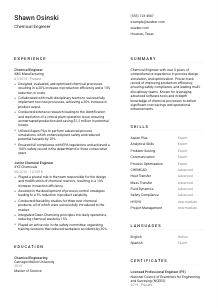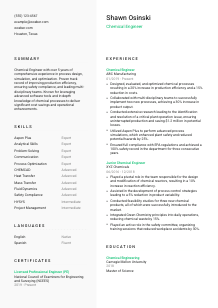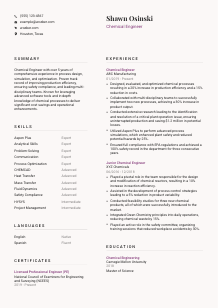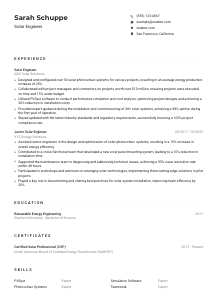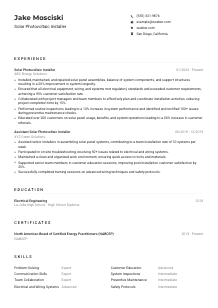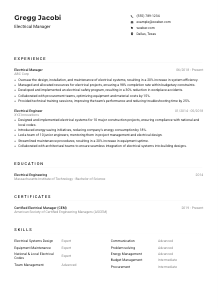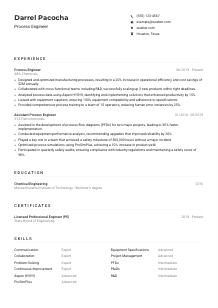Chemical Engineer Resume Example
Mixing compounds, but your resume seems volatile? Balance it out with this Chemical Engineer resume example, blended with Wozber free resume builder. Grasp how you can effectively integrate your chemical wizardry with job specifics, concocting a career formula as powerful as your reactions!
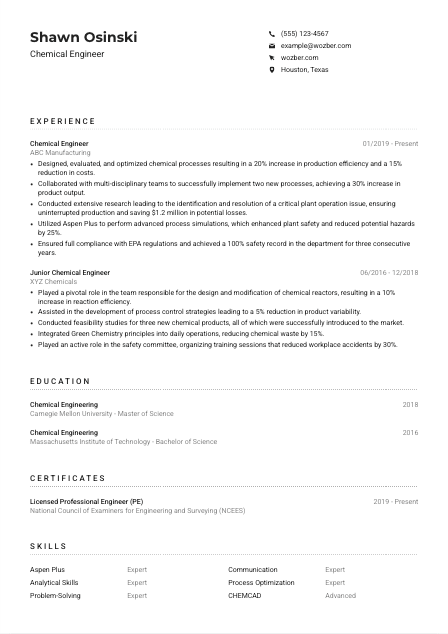
How to write a Chemical Engineer resume?
Hello, aspiring Chemical Engineer mastermind! In the realm of Chemical Engineering, where precision and innovation intersect, your resume stands as the catalyst for your career. It's not merely a document; it's your personal manifesto, showcasing your prowess and potential to transform industries. Leveraging the power of Wozber free resume builder, this guide is meticulously crafted to guide you in creating a resume that resonates perfectly with your desired Chemical Engineer role.
Ready to engineer your career pathway? Let's distill your expertise into a resume that makes a lasting impression!
Personal Details
Your journey into the meticulous world of Chemical Engineering begins with personalizing your resume. In this critical section, every detail counts in presenting you as the ideal candidate. Tailoring your contact information to align with the Chemical Engineer job requirements ensures a seamless match. Here's how to perfect this section to create an immediate connection with your potential employer.
1. Your Name: The Foundation of Your Brand
Make your name prominent – it's your brand. Opt for a clear, professional font, making it slightly larger than the rest of the text. This ensures your name is the first thing that captures the employer's attention.
2. Job Title Alignment: Identify with Your Desired Role
Adding the exact job title from the description, such as 'Chemical Engineer', immediately below your name, showcases your focused ambition and aligns your identity with the role at hand.
3. Essential Contact Info: Keeping It Professional
Incorporate only your most crucial contact details: A phone number you frequently check and a professional email address, typically in the firstname.lastname@email.com format. This simplifies the employer's task of reaching you.
4. Location Relevance: Show You're In the Right Place
"Must be located in or willing to relocate to Houston, Texas." Mentioning Houston, Texas, as your location neatly ticks off a vital requirement, subtly reassuring employers of your availability and reducing potential relocation concerns.
5. Digital Presence: A Link to Your Professional World
A well-maintained LinkedIn profile can serve as a dynamic extension of your resume. If it's up-to-date and reflective of your resume, include it. This offers employers a deeper dive into your professional persona.
Takeaway
The Personal Details section is essentially your resume's introduction – think of it as your moment to shine. Making it professional yet personalized ensures you start on the right foot, setting the stage for what's to come.





Experience
In the world of Chemical Engineering, your experience illuminates your capacity to innovate and solve complex problems. The Experience section is your platform to demonstrate your expertise and achievements. Here's how to crystallize your experiences into evidence of your prowess, mirroring the job's demands.
- Designed, evaluated, and optimized chemical processes resulting in a 20% increase in production efficiency and a 15% reduction in costs.
- Collaborated with multi‑disciplinary teams to successfully implement two new processes, achieving a 30% increase in product output.
- Conducted extensive research leading to the identification and resolution of a critical plant operation issue, ensuring uninterrupted production and saving $1.2 million in potential losses.
- Utilized Aspen Plus to perform advanced process simulations, which enhanced plant safety and reduced potential hazards by 25%.
- Ensured full compliance with EPA regulations and achieved a 100% safety record in the department for three consecutive years.
- Played a pivotal role in the team responsible for the design and modification of chemical reactors, resulting in a 10% increase in reaction efficiency.
- Assisted in the development of process control strategies leading to a 5% reduction in product variability.
- Conducted feasibility studies for three new chemical products, all of which were successfully introduced to the market.
- Integrated Green Chemistry principles into daily operations, reducing chemical waste by 15%.
- Played an active role in the safety committee, organizing training sessions that reduced workplace accidents by 30%.
1. Dissect the Job Requirements
Start with a thorough analysis of each requirement. For instance, "Minimum of 3 years of experience in process design, simulation, or optimization" provides a solid foundation for what your prospective employer values.
2. Structure Your Professional Journey
Arrange your roles chronologically, spotlighting your journey and evolution in the field of Chemical Engineering. Highlight titles, companies, and durations that speak directly to the job description.
3. Craft Impactful Accomplishments
Each role you list should be accompanied by accomplishments that resonate with the job's needs. For example, "Utilized Aspen Plus to perform advanced process simulations" directly correlates with the desired skill set.
4. Quantify Your Successes
Numbers speak. When you say, "Enhanced plant safety, reducing potential hazards by 25%," it provides a tangible measure of your contribution, making your achievements more credible and compelling.
5. Relevance is Key
Dedicate this space to experiences that align directly with the Chemical Engineering role you're targeting. This isn't the place for unrelated accomplishments – focus on what makes you the perfect fit for this specific position.
Takeaway
Your experience isn't just a list of roles; it's a narrative of your professional journey and contributions. Tailor this section to reflect your suitability and standout ability for the Chemical Engineer position. Precision here will fuel your resume's impact.
Education
In the intricate field of Chemical Engineering, your educational background lays down the theoretical foundation of your expertise. This section is your opportunity to align your academic achievements with the role's expectations. Let's refine this section to illustrate your preparedness for the challenges of Chemical Engineering.
1. Zero In on Key Educational Requirements
Identify the explicit educational criteria within the job posting. The requirement for a "Bachelor's degree in Chemical Engineering or a related field" sets a clear benchmark to meet or exceed in your resume.
2. Structure with Clarity
Present your academic qualifications in a neat, organized manner - degree, field of study, institution, and graduation year. This straightforward presentation ensures the information is easily digestible.
3. Match Your Degree to the Job
If your degree directly aligns with the job's requirements, as in the given resume example, make sure it's front and center. It confirms at a glance that you possess the fundamental academic grounding the job demands.
4. Relevant Courses and Projects
Especially for early-career professionals, mentioning specific courses or projects can shine a light on your proactive engagement with key aspects of Chemical Engineering beyond the classroom.
5. Additional Academic Achievements
If you've attained any honors, participated in relevant extracurricular activities, or completed significant research projects, briefly mention these. They add layers to your academic profile, showcasing a well-rounded candidate.
Takeaway
Your education is a testament to your determination and readiness to tackle the challenges in the field of Chemical Engineering. Ensure it aligns with your prospective employer's expectations, painting a picture of a candidate who's not just qualified, but passionately engaged with their field.
Certificates
In the Chemical Engineering domain, certifications can significantly bolster your expertise and commitment to continuous improvement. This section sheds light on your specialized skills and knowledge, aligning with professional standards.
1. Identify Relevant Certifications
Peruse the job description for any explicit certification requirements. While the provided job description doesn't specify this, including relevant certifications, like a Licensed Professional Engineer (PE), demonstrates a proactive commitment to excellence.
2. Prioritize Pertinent Certifications
Focus on certifications that align closely with the job's demands and the broader field of Chemical Engineering. This helps in presenting you as a well-prepared and knowledgeable candidate.
3. Date of Certification
For certifications that have a validity period or were recently attained, listing the date showcases your current credentials and reflects your up-to-date expertise.
4. Continuous Learning
The engineering field evolves, and so should you. Highlighting recent certifications or ongoing learning endeavors exhibits your adaptability and dedication to staying relevant.
Takeaway
Your pursuit of certifications underscores your dedication to excellence in the Chemical Engineering field. This section showcases your initiative and commitment to professional development, further compelling hiring managers to see you as an ideal candidate.
Skills
The Skills section is a concentrated showcase of your expertise. For a Chemical Engineer, this is where your technical proficiency meets your soft skill prowess, offering a snapshot of your professional toolkit. Let's delve into perfecting this section to align with the specific demands of your dream role.
1. Extract Skills from the Job Description
Decipher the job requirements to identify both explicit and implicit skills needed. Incorporating skills like "Strong proficiency in using process simulation software like Aspen Plus" directly from the job description is a strategic move.
2. Highlight Matching Skills
List the skills you possess that directly correspond to the job description. For a Chemical Engineer, hard skills like software proficiency and knowledge in heat transfer, paired with soft skills such as problem-solving and communication, are invaluable.
3. Organize for Impact
Prioritize your skills based on the job's requirements and your own proficiency level. A well-organized skill section points hiring managers to your strengths, making it easy for them to recognize your fit for the role.
Takeaway
Your skill set is your arsenal. In a field as dynamic as Chemical Engineering, showcasing a blend of technical and soft skills tailored to the job's specific requirements makes you a compelling candidate. This is your chance to impress.
Languages
In the global field of Chemical Engineering, your ability to communicate in different languages can underscore your adaptability and broad-minded approach. While the job description might prioritize English proficiency, showcasing additional languages can enhance your resume.
1. Align with Job Language Requirements
First, highlight your proficiency in languages explicitly mentioned in the job posting. For this role, being able to "express oneself clearly in English" is mandatory, making your English proficiency a top priority to mention.
2. Showcase Additional Languages
Listing other languages you're fluent in can illustrate your potential for cross-cultural collaboration and adaptation in a globally connected world.
3. Be Honest About Your Level
Clearly state your proficiency level for each language. Being transparent about this assures hiring managers of your communication capabilities.
4. Comprehend the Role's Global Aspect
Understanding the global context of the role can aid in prioritizing which additional languages to mention. For a Chemical Engineer, the ability to work with international teams or understand global standards could be invaluable.
5. Reinforce Your Global Perspective
Beyond mere communication, your linguistic skills highlight your readiness to engage in a global dialogue, enriching your professional interactions and broadening your influence in the field.
Takeaway
By strategically presenting your linguistic skills, you showcase not just your communication ability but also your global outlook and adaptability – qualities that are increasingly significant in the expansive field of Chemical Engineering.
Summary
Your resume's Professional Summary is the conciseness of your career narrative. It's the first detailed encounter a hiring manager has with your profile. In the domain of Chemical Engineering, where innovation meets precision, your summary is a distilled essence of your expertise. Here's how to craft a summary that captures attention and resonates with the job requirements.
1. Unpack the Job Essence
Before diving in, thoroughly understand the job's core requirements and how your experience and skills align with them. This forms the foundation of a summary that speaks directly to what the employer is seeking.
2. Start with a Strong Introduction
Begin with a statement that encapsulates your professional stature and experience. For example, "Chemical Engineer with over 5 years of comprehensive experience in process design, simulation, and optimization" immediately sets the tone.
3. Reflect Key Job Highlights
Pinpoint key requirements from the job description and echo them in your summary. Demonstrating how you've embodied these in past roles, as with using Aspen Plus for process simulations, directly connects your experience with employer needs.
4. Keep It Snappy
While providing a thorough overview, your summary should be concise and punchy, intriguing enough to encourage the hiring manager to dive deeper into your resume.
Takeaway
Think of your Professional Summary as the initial reaction that sets the stage for a favorable outcome. Tailored to reflect the job's requirements, it's an elevator pitch that heightens interest in your candidacy. Let it reflect your expertise, ambition, and the unique impact you're poised to make as a Chemical Engineer.
Embark on Your Chemical Engineer Endeavor
Congratulations on navigating through the intricacies of tailoring your resume for a Chemical Engineer role! Empowered with these insights and Wozber's free resume builder, including ATS-compliant resume formats and ATS resume scanner, you're ready to synthesize a resume that not only meets but exceeds expectations. Your meticulously crafted resume is now the vessel for your career aspirations. It's time to make your mark in the world of Chemical Engineering. Let your resume be the catalyst for your success!

- Bachelor's degree in Chemical Engineering or a related field.
- Minimum of 3 years of experience in process design, simulation, or optimization.
- Strong proficiency in using process simulation software such as Aspen Plus, CHEMCAD, or HYSYS.
- In-depth knowledge of chemical processes, including heat transfer, mass transfer, and fluid dynamics.
- Excellent analytical, problem-solving, and communication skills.
- Ability to express oneself clearly in English is required.
- Must be located in or willing to relocate to Houston, Texas.
- Design and evaluate chemical processes based on data from lab experiments and other sources.
- Optimize production processes to maximize efficiency and reduce costs.
- Collaborate with multi-disciplinary teams to ensure the safe and effective implementation of new processes or modifications.
- Conduct research and provide technical support for plant operations, troubleshooting issues as they arise.
- Ensure compliance with all relevant safety, health, and environmental regulations and standards.





